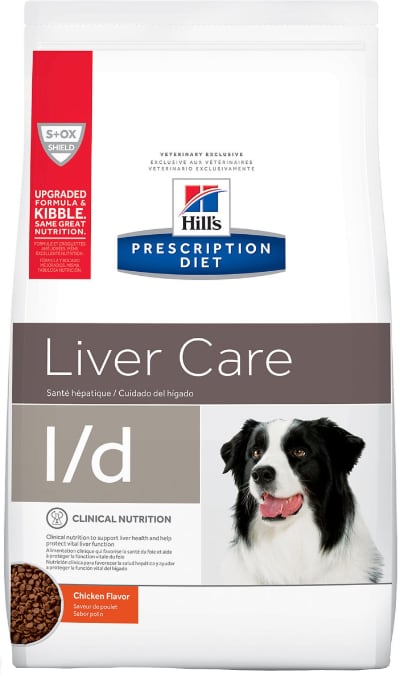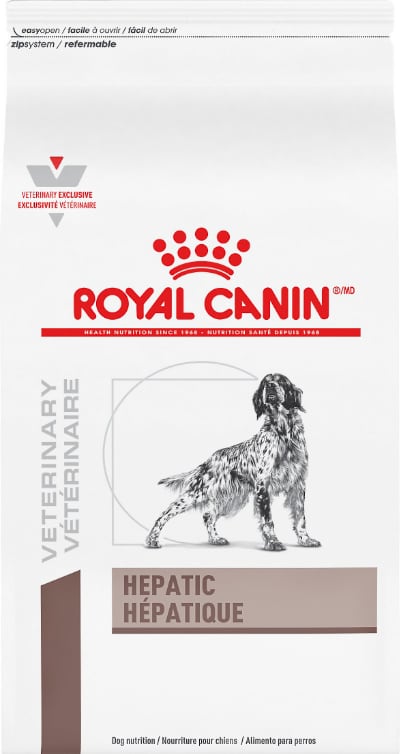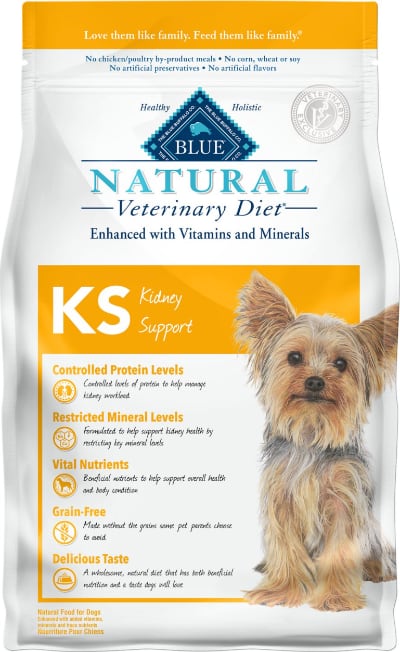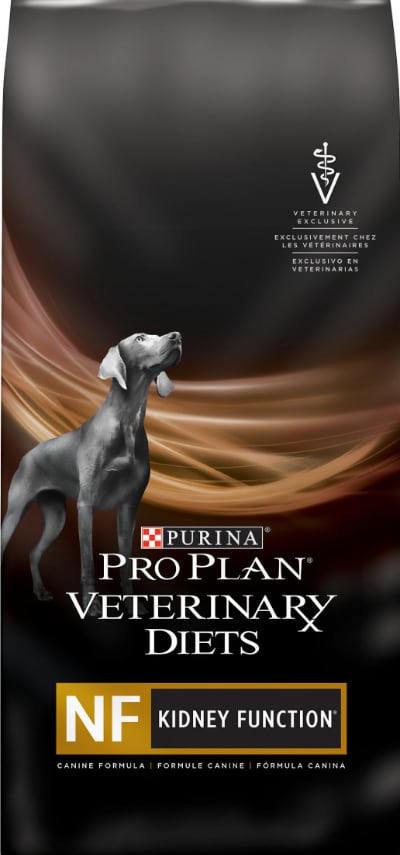
This review aims to give you a definitive guide to some of the best dog food for liver disease that can be found in 2024.
The liver is the powerhouse of the body. It builds important proteins for the body, transforms excess proteins into storable energy, aids in fat digestion, metabolises vitamins and minerals, and purifies the blood by breaking down toxic molecules so they can be eliminated by the kidneys.
The liver is one tough cookie and has amazing self-regenerative powers. While it can take quite a beating, however, even the toughest of nuts eventually crack under pressure.
Therefore, when the veterinarian tells you that there is something wrong with the liver, it is time to take things very seriously.
The liver can also be seen as the manager of the body. It serves as a link between the gut and the rest of the body, and almost everything that is digested must pass through it first to be transformed in some way.
It is no surprise that there are a number of different dog foods available on the market that maintain liver health by reducing the load on it and allowing it to take it easy.
As a veterinarian, I deal with hepatic cases on a day to day basis and spend a lot of time researching the best dog foods for liver disease to recommend to my clients.
An adequate diet is only one aspect of managing liver diseases in dogs. When there is already a decrease in liver function, the diet can only hope to do some damage control.
Dog liver disease is a very serious medical issue and IT IS IMPERATIVE TO SEE A VET regularly in order to manage the specific condition as often patients need to be prescribed the right medicine to go along with their food, and to help the find the best targeted choice of food for their specific liver condition.
This article will explain or discuss:
- What to look for when buying food for a dog with hepatic disease.
- The differences between different diets and what they aim to treat.
- How some ingredients can help.
- Food options for dogs needing some encouragement to eat their food.
Let’s get started.
Our Best Dog Food for Liver Disease
- Hill’s Prescription Diet l/d Liver Care Dry Dog Food
- Royal Canin Veterinary Diet Hepatic Formula Dry Dog Food
- Blue Buffalo Natural Veterinary Diet KS Kidney Support Grain-Free Formula Dry Dog Food
- Purina Pro Plan Veterinary Diets NF Kidney Function Formula Dry Dog Food
4 Best Dog Foods for Dogs With Liver Disease Reviewed
Below you’ll find a list of dog foods that I find to be the best at managing liver disease.
Hill’s Prescription Diet l/d Liver Care Dry Dog Food
- First 5 ingredients: Brewers Rice, Chicken, Chicken Fat, Egg Product, Soybean Meal
- Guaranteed Analysis: 14.5% Crude Protein, 19% Crude Fat, 6% Crude Fiber, 10% Moisture
- Caloric Content: 438kcal/cup
- Type of product: Veterinary Diet
- Life stage: Adult
- Best for: Long term management of hepatic disease
This moderate protein level dog food is arguably one of the best diets around for dogs with liver disease.
It takes advantage of the high biological value of egg product protein which is incorporated as the first protein rich ingredient of the formulation.
This helps your dog make the most out of the moderate protein levels allowed.
This dog food also contains DL-Methionine, L-Carnitine, and L-Arginine at significant levels, profiting from their liver metabolism-enhancing and liver protectant properties.
The diet’s controlled copper content makes sure that the element does not build up to dangerous levels in the liver in case your dog has copper storage issues.
The diet is relatively rich in lipids in the form of pork fat which makes it palatable and energy-dense for even the fussiest dog. However, this can be taxing on the liver’s metabolism in cases involving the biliary system.
You can find this dog food also in wet form.
Royal Canin Veterinary Diet Hepatic Formula Dry Dog Food
- First 5 ingredients: Brewers Rice, Corn, Brown Rice, Soy Protein Isolate, Chicken Fat
- Guaranteed Analysis: 14% Crude Protein, 14% Crude Fat, 3.9% Crude Fiber, 10% Moisture
- Caloric Content: 323 kcal/cup
- Type of product: Veterinary Diet
- Life stage: Adult
- Best for: Long term management of hepatic disease
This diet is also one of my favorites when it comes to managing dog liver problems. It is an energy-dense diet that is moderate in high-quality protein and fat.
The biological value of soy protein isolate is not as high as that of egg protein but is still sufficiently high to complement this hepatic diet.
This diet lacks L-arginine, missing out on its liver protectant properties in cases of biliary associated liver problems. It does however contain DL-Methionine and L-Carnitine to help with the liver’s metabolic processes.
The diet is also rich in dried beet pulp which is high in fiber and traps harmful substances in the gut to reduce the workload on the liver. The fructooligosaccharides in the diet also promote the growth of healthy gut flora.
Vitamins and antioxidants in the diet reduce free radical damage to the liver. This dog food is low in copper, reducing its accumulation in the liver which can lead to liver damage in dogs suffering from copper storage liver disease.
The high essential fatty acid content in the diet, especially omega 3 fatty acids, helps with liver healing and regeneration.
This diet can also be found in wet form.
Blue Buffalo Natural Veterinary Diet KS Kidney Support Grain-Free Formula Dry Dog Food
- First 5 ingredients: Deboned Chicken, Potato Starch, Pea Starch, Peas, Potatoes
- Guaranteed Analysis: 14% Crude Protein, 18% Crude Fat, 7% Crude Fiber, 10% Moisture
- Caloric Content: 404 kcal/cup
- Type of product: Veterinary Diet
- Life stage: Adult
- Best for: Temporary management of hepatic disease.
Blue Buffalo has no pet food specifically made for dogs with liver problems.
However, their Kidney Support formula can be a decent temporary replacement if you and your vet find yourself in a pickle. It has controlled levels of high biological value protein sources, such as dried egg product.
The food is supplemented with the usual L-Carnitine, DL-Methionine, omega 3 fatty acids, vitamin E, and prebiotics that can help liver function and aid in the concerted effort to protect the liver.
It is worth repeating that this diet is not ideal for long term management and should only be used when liver care diets are not available. Your dog should be changed back to a liver support diet as soon as this is available.
This diet is available in wet form.
Purina Pro Plan Veterinary Diets NF Kidney Function Formula Dry Dog Food
- First 5 ingredients: Whole Grain Corn, Brewers Rice, Dried Egg Product, Animal Fat Preserved With Mixed-Tocopherols, Sugar
- Guaranteed Analysis: 12.5% Crude Protein, 13% Crude Fat, 2.5% Crude Fiber, 12% Moisture
- Caloric Content: 478 kcal/cup
- Type of product: Veterinary Diet
- Life stage: Adult
- Best for: Temporary management of hepatic disease.
Seeing another renal function dog food in this list might come as a surprise but renal diets are good alternatives to hepatic diets if you are stuck between a rock and a hard place.
Like hepatic diets, renal diets are energy-dense and aim to use lower quantities of high-quality protein.
This Purina dog food aims to do just that by incorporating ingredients such as corn, rice, dried whey, egg, sugar, and lower levels of fat.
This diet, however, is not good to feed to hepatic patients over extended periods of time. This diet is low in calcium, phosphorus and sodium levels, which can lead your dog to develop deficiencies of those ions and other debilitating conditions.
This diet is available in wet form.

What Causes Liver Disease?
Many things can cause liver disease including toxins, infections, diet, genetic issues, etc.
Unfortunately, the visible symptoms usually show up quite a long time after the initial damage.
This is why I often encourage owners to remember their regular veterinary check ups and ideally perform a blood test once a year to catch any problems at an early stage.
Are Certain Breeds More Prone to Liver Disease?
Yes, some liver conditions are associated with a number of breeds.
Copper storage disease, common in Bedlington Terriers, Labrador Retrievers, and Dalmatians, is characterised by the inability of the liver to rid the body from excess copper.
Canine Chronic Hepatitis is characterised with chronic liver inflammation resulting in slow but steady liver damage.
It is more common in Bedlington Terriers, Labrador Retrievers, Cocker Spaniels, Doberman Pinschers, Skye Terriers, Standard Poodles, Springer Spaniels, Chihuahuas, Maltese, West Highland White Terriers.
Cairn Terriers, Bull Terriers, Beagles, West Highland White Terriers often suffer from Congenital Polycystic Liver disease. These cysts can significantly affect the liver’s performance and have to sometimes be removed surgically when management is not enough.
Glycogen Storage Disease can be seen in some Maltese dogs, German Shepherds, Curly Coated Retrievers. It is a genetic disease characterised by excessive glycogen storage due to a reduced ability to produce a key enzyme involved in it’s metabolism.
Hepatic Amyloidosis is associated with Shar-peis and results in in amyloid deposition in the liver following fever and lameness due to joint inflammation and swelling. The deposition of amyloid in the liver can interfere with liver function and quicken the onset of liver failure in these dogs.
Gallbladder Mucocele is more commonly seen in Shetland Sheepdogs and is a result of reduced gallbladder expression due to abnormal mucin rich contents of very thick consistency.
A hepatic diet can benefit dogs suffering from the above conditions in different ways.
However, the most important thing is that these diets provide the liver with a lower workload than regular diets, allowing it to keep the body going without being overwhelmed.
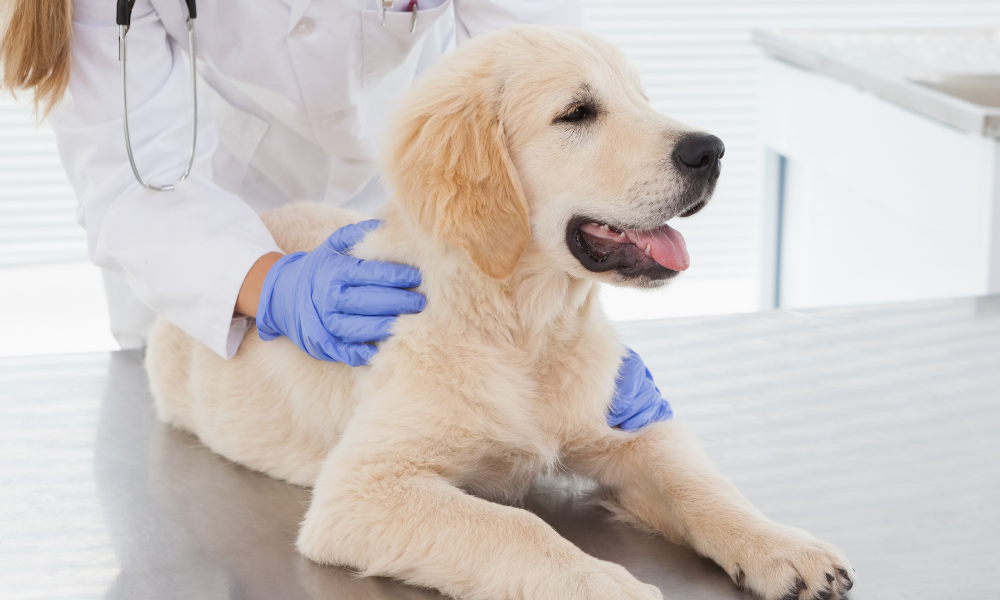
Prescription Food for Treating Dogs With Liver Disease
Veterinary prescription pet food is really the only way to go. The liver is intimately associated with the digestive system and is involved in digestion of gut content and metabolism of what is absorbed by the gut.
It should therefore come as no surprise that whatever your dog eats will heavily influence the liver’s condition especially when diseased.
These veterinary diets are:
Available by Prescription
Dog food for liver disease is not nutritionally complete for dogs with healthy livers. It is therefore available through veterinary prescription after diagnosing a liver problem.
Highly Palatable and Energy Dense
Dogs with liver issues often have decreased appetite. The energy density of these diets makes sure that dogs with poor appetites get the necessary nutrients.
These diets are also highly palatable to entice your dog’s appetite.
Lower Protein Level
Most dog foods for liver support have lower protein levels than regular dog food to reduce the liver’s workload.
The proteins present are also of high biological value in order to make the most efficient use of their amino acids while keeping the metabolic load on the liver as low as possible.
Fat Content
Liver support diets have varying fat content. Fat can be a great way to increase the palatability and energy density of a diet but on the other hand it can add to the metabolic stress of the liver.
It is particularly bad when the dog’s liver problem is associated with the bile duct system. Only your veterinarian can tell you what fat level is suitable for your dog.
Low in Copper
Most of these diets are also good for dogs having copper storage disease. This is when your dog is not able to get rid of copper properly, leading to its accumulation in the liver. This copper accumulation leads to liver damage.
Carbohydrates
These include sugars, starches, and different kinds of fibers. The sugars and easily digestible carbohydrates provide the diet with the bulk of its energy content.
The fiber provides the gut with the necessary environment for healthy bowel movement and fermentation; promoting the growth of healthy bacteria and fatty acid fermentation and decreasing the production of toxic by-products.
Additives and Supplements
Different diets contain different additives. Liver support diets are usually higher in antioxidants, vitamins and other lipotropic substances.
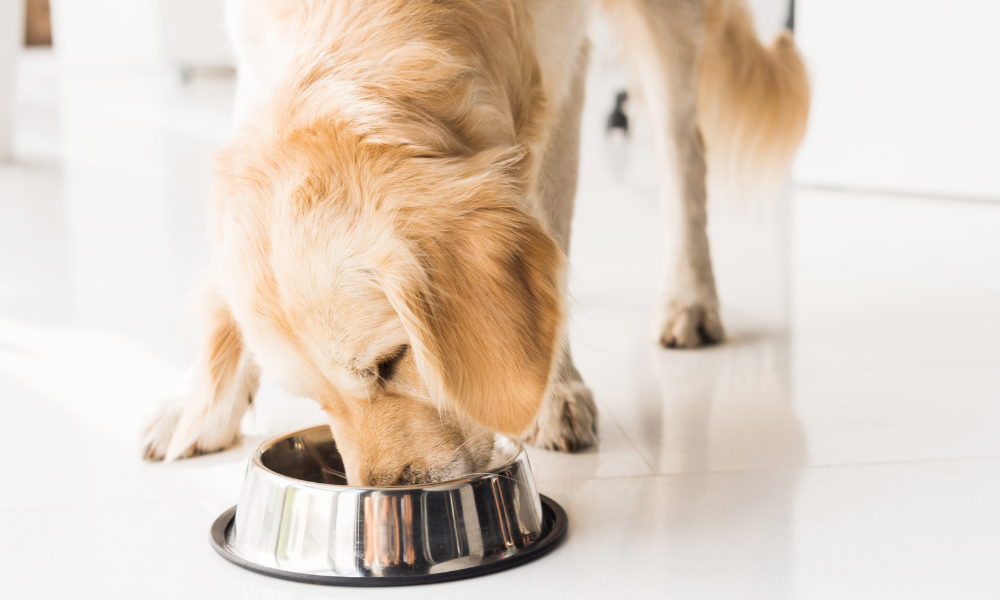
The Bottom Line
I hope you enjoyed our list of what we think are the most appropriate dog foods for liver disease.
As said before, the liver is heavily involved in the body’s metabolism. This makes it one of the most important organs of the body. When it’s health is compromised, supporting it’s recovery or preventing further damage is paramount to prevent further damage and maintain your dog’s quality of life.
As a veterinarian, I have often used liver support diets by Hill’s and Royal Canin and I feel that both diets have their own merits.
I use Hill’s Prescription Diet l/d Liver Care where the increased fat content in the diet would not cause an issue.
In cases where it does, like in cases where the gallbladder and its associated biliary system are compromised I prefer to use Royal Canin Veterinary Diet Hepatic Formula.
Our list also includes renal support diets. The diseased liver and kidney have some similarities in their requirements when diseased. This does not mean that one can use these diets interchangeably.
Your veterinarian can decide to use renal support diets for your dog for a short time only when a liver support diet is not available. Switching back to a liver support diet should be first thing on your agenda.
FAQ
How Do You Feed Dogs With Liver Disease?
It is best to feed your dog frequent small meals. Smaller amounts are easier on the digestive system and the liver.
If a dog with liver problems loses his appetite you can try mixing dry and wet food. However, if this does not work it is in the dog’s best interest to go to the vet.
What to Feed a Dog With Liver Problems?
Unfortunately, every dog with liver issues has special dietary needs which neither your culinary skills nor any standard dog food will be able to cater for.
These kinds of diets are precisely formulated and tested in labs to ensure quality control.
What Are the Symptoms of Liver Disease?
Common liver disease symptoms that you might notice at home are:
– Decreased appetite
– Abdominal discomfort
– Diarrhea
– Vomiting and regurgitation
– Pacing and restlessness
– Yellowing eyes and gums
– Lack of energy
– Abnormal behaviour (eg. staring at the wall, circling,incoordination of body movements)
You may notice only one, or more symptoms at a time. Symptoms may disappear and reappear later.
Can You Prevent Liver Disease?
Liver disease can be somewhat prevented through a good diet and by keeping up to date with your dog’s yearly vaccinations.
While it is not possible to prevent all liver diseases, taking your dog for a yearly check-up (ideally including a blood test) can go a long way to catching liver conditions early and starting to manage them before any serious damage is done.
How to Treat Liver Disease?
If you think that your dog might have a liver condition, please step away from your medicine cabinet, get off the internet, refrain from asking grandma for her wisdom, and go to the vet.
The vet is the person best equipped to help you deal with this. As explained, treatment for liver disease can be as different as its causes.
Communicate with your vet and help them address your concerns and any queries regarding the management of the specific condition.
Discuss with your vet which one of the above diets is best suited for your dog’s condition.

